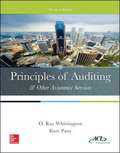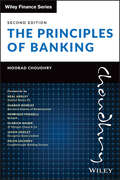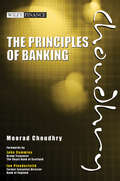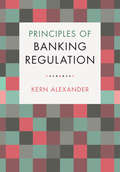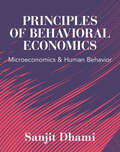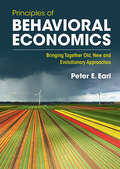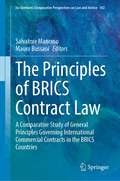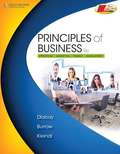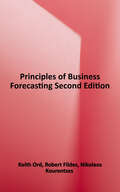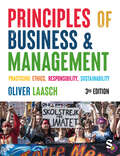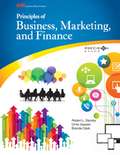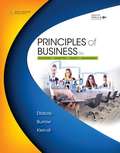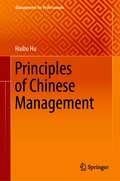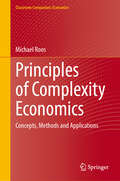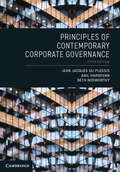- Table View
- List View
Principles Of Auditing And Other Assurance Services
by Ray O. Whittington Kurt PanyThe 20th edition of Principles of Auditing & Other Assurance Services provides a carefully balanced presentation of auditing theory and practice. Written in a clear and understandable manner, it is particularly appropriate for students who have had limited or no audit experience. The approach is to integrate auditing material with that of previous accounting financial, managerial, and systems courses.
Principles of Automated Negotiation
by Shaheen Fatima Sarit Kraus Michael WooldridgeWith an increasing number of applications in the context of multi-agent systems, automated negotiation is a rapidly growing area. Written by top researchers in the field, this state-of-the-art treatment of the subject explores key issues involved in the design of negotiating agents, covering strategic, heuristic, and axiomatic approaches. The authors discuss the potential benefits of automated negotiation as well as the unique challenges it poses for computer scientists and for researchers in artificial intelligence. They also consider possible applications and give readers a feel for the types of domains where automated negotiation is already being deployed. This book is ideal for graduate students and researchers in computer science who are interested in multi-agent systems. It will also appeal to negotiation researchers from disciplines such as management and business studies, psychology and economics.
The Principles of Banking (Wiley Finance)
by Moorad ChoudhryIn the newly revised Second Edition of The Principles of Banking, Professor Moorad Choudhry delivers a comprehensive overview of the fundamentals of banking designed to offer senior management and regulators a roadmap toward a more sustainable business model for their banks. The book builds on the author's experience as a practitioner in commercial and investment banking over many years, and this makes it suitable for both academic and professional audiences. The author explains the original principles of banking, including the need for sound lending policy, capital management and liquidity risk management, and why these need to be maintained robustly to ensure the industry avoids another banking crisis during the next economic recession. Readers can access a wide range of downloadable ancillary materials, including policy templates, spreadsheet models, risk metric dashboards, and PowerPoint slides. This Second Edition offers: Updates to reflect new regulations published since the last edition, including Basel III Final Form and its constituent elements of The Fundamental Review of the Trading Book, Interest Rate Risk in the Banking Book, and Recovery and Resolution Planning New chapters in market risk management, foreign exchange risk management, and interest rate risk, as well as credit risk policy and management, and capital and liquidity adequacy stress testing regulations New material covering the impact of COVID-19 on banks, risk management, and balance sheet management and what this implied for the discipline of risk management going forward A recommended approach to bank asset-liability management good-practice, to enable a bank to deliver an optimised balance sheet for all stakeholders' benefit Perfect for bank practitioners, including managers in retail and commercial banking, ALCO members, treasury professionals, all C-suite executives and board non-executive directors, The Principles of Banking is an indispensable resource for all professionals and students seeking an authoritative and practical guide to the foundations of modern banking and good banking practice.
The Principles of Banking
by Moorad ChoudhryThe ultimate guide for bank management: how to survive and thrive throughout the business cycle An essential guide for bankers and students of finance everywhere, The Principles of Banking reiterates that the primary requirement of banking--sound capital and liquidity risk management--had been forgotten in the years prior to the financial crash. Serving as a policy guide for market practitioners and regulators at all levels, the book explains the keys to success that bankers need to follow during good times in order to be prepared for the bad, providing in-depth guidance and technical analysis of exactly what constitutes good banking practice. Accessible to professionals and students alike, The Principles of Banking covers issues of practical importance to bank practitioners, including asset-liability management, liquidity risk, internal transfer pricing, capital management, stress testing, and more. With an emphasis on viewing business cycles as patterns of stable and stressful market behavior, and rich with worked examples illustrating the key principles of bank asset-liability management, the book is an essential policy guide for today and tomorrow. It also offers readers access to an accompanying website holding policy templates and teaching aids. Illustrates how unsound banking practices that were evident in previous bank crashes were repeated during the creation of the 2007-2008 financial market crisis Provides a template that can be used to create a sound liquidity and asset-liability management framework at any bank An essential resource for the international banking community as it seeks to re-establish its credibility, as well as for students of finance Explains the original principles of banking, including sound lending policy and liquidity management, and why these need to be restated in order to avoid another bank crisis at the time of the next economic recession Covers topics of particular importance to students and academia, many of which are marginally--if ever--addressed in current text books on finance Offers readers access to a companion website featuring invaluable learning and teaching aids Written by a banking practitioner with extensive professional and teaching experience in the field, The Principles of Banking explains exactly how to get back to basics in risk management in the banking community, essential if we are to maintain a sustainable banking industry. "engaging and interesting and, more importantly, easily understood, allowing a clear picture to emerge of how the principle or concept under discussion is to be applied in the real world. " - Graeme Wolvaardt, Head of Market & Liquidity Risk Control, Europe Arab Bank Plc
Principles of Banking Regulation
by Kern AlexanderAn accessible, comprehensive analysis of the main principles and rules of banking regulation in the post-crisis regulatory reform era, this textbook looks at banking regulation from an inter-disciplinary perspective across law, economics, finance, management and policy studies. It provides detailed coverage of the most recent international, European and UK bank regulatory and policy developments, including Basel IV, structural regulation, bank resolution and Brexit, and considers the impact on bank governance, compliance, risk management and strategy.
Principles of Behavioral Economics: Microeconomics and Human Behavior
by Sanjit DhamiPrinciples of Behavioral Economics, written by an acknowledged leader in the field, provides a comprehensive introduction to one of the most exciting areas of modern economics. It demonstrates how models of economic theory can be enriched by using interdisciplinary insights from psychology, sociology, evolutionary biology, and neuroscience to build the basis for a more empirically supported set of economic principles. Unique in its level of rigor and lucidity, the book highlights the important link between theoretical and empirical economics by demonstrating the usefulness of a range of data sources such as observational data, lab data, survey data, and neuroeconomic data. This field-defining textbook argues that behavioral economics is not just a supplement to mainstream economics. Taking behavioral economics seriously requires a total rethink, and eventual transformation, of every area of economics.
Principles of Behavioral Economics: Bringing Together Old, New and Evolutionary Approaches
by Peter E. EarlThis book is unique among modern contributions to behavioral economics in presenting a grand synthesis between the kind of behavioral economics popularized by Richard Thaler, earlier approaches such as those of the 1978 Nobel Laureate Herbert Simon, evolutionary psychology, and evolutionary economics from Veblen and Marshall through to neo-Schumpeterian thinking. The synthesis employs a complex adaptive systems approach to how people think, the lifestyles they build, and how new production technologies and products are gradually adopted and produce changes. Using a huge range of examples, it takes behavioral economics from its recent focus on 'nudging' consumers, to the behavior of firms and other organizations, the challenges of achieving structural change and transitioning to environmentally sustainable lifestyles, and instability of the financial system. This book will be of great interest to academics and graduate students who seek a broader view of what behavioral economics is and what it might become.
The Principles of BRICS Contract Law: A Comparative Study of General Principles Governing International Commercial Contracts in the BRICS Countries (Ius Gentium: Comparative Perspectives on Law and Justice #102)
by Salvatore Mancuso Mauro BussaniThis book examines national reports on contract law in each of the BRICS countries (Brazil, Russia, India, China and South Africa) in order to provide a comparative analysis. It then establishes common principles, where possible, as well as a set of general “soft law” principles governing international commercial contracts in these countries. The importance of commercial transactions in the BRICS countries is rapidly growing, yet differences in contract law among these countries can lead to misunderstandings and disputes. The rapid development of the BRICS instruments (and the legal implications of their use) suggests the need to address common legal issues that could harm the continued development of the BRICS economies. Contract law represents one of the core areas in which this process can take place. Addressing the salient legal issues within the BRICS discourse requires a comprehensive, comparative approach that explores the different solutions provided by each member country, in order to identify similarities and convergences. This process may ultimately help to reduce the legal obstacles to, and indirect costs of, cross-border transactions by offering a transparent and predictable legal environment for any future attempt at adopting common legal instruments.
Principles of Building Business Credit
by Norman David RoussellPrinciples of Building Business Credit is a comprehensive book that teaches a systematic approach for business owners to establish a business credit profile and build business credit. The book includes a list of over 60 of the top business friendly creditors in the U.S., a list of over 30 of the best business credit cards, the top angel invcestment groups in the U.S., the top venture capital firms for growing businesses in the U.S., and much more.
Principles of Business
by Les R. Dlabay James L. Burrow Brad A. KleindlPRINCIPLES OF BUSINESS, Ninth Edition, provides complete instruction in business concepts and skills students need in today's competitive environment. This market-leading introductory business text offers extensive coverage in major business concepts, such as finance, marketing, operations, and management. Students gain valuable information and skills for the workplace, as well as preparation for success in competitive events, such as DECA, FBLA, and BPA.
Principles of Business
by Les R. Dlabay James L. Burrow Brad A. KleindlPRINCIPLES OF BUSINESS, Eighth Edition, prepares students for the real world of business with complete coverage of finance, marketing, operations, and management.
Principles of Business Forecasting, 2nd ed
by Keith Ord Robert Fildes Nikolaos KourentzesThis second edition of Principles of Business Forecasting by Keith Ord, Robert Fildes, and newest author Nikolaos Kourentzes serves as both a textbook for students and as a reference book for experienced forecasters in a variety of fields. The authors' motivation for writing this book, is to give users the tools and insight to make the most effective forecasts drawing on the latest research ideas, without being overly technical. The book is unique in its design, providing an introduction to both standard and advanced forecasting methods, as well as a focus on general principles to guide and simplify forecasting practice for those with little or no professional experience. One of the book's key strengths is the emphasis on real data sets, which have been updated in this second edition. These data sets are taken from government and business sources and are used throughout the chapter examples and exercises. Forecasting techniques are demonstrated using a variety of software platforms beyond just "R," and a companion website provides easy-to-use Excel(R) macros that users can access to conduct analyses. Another important innovation in the second edition is the tutorial support for using open-source R programs, making all the methods available for use both in courses and practice. After the introductory chapters, the focus shifts to using extrapolative methods (exponential smoothing and ARIMA), and then to statistical model-building using multiple regression. The authors also cover more novel techniques including data mining and judgmental methods, which are gaining increasing attention in applications. The second edition also offers expanded material on data analytics, in particular neural nets together with software, and applications that include new research findings relevant and immediately applicable to operations, such as hierarchical modeling and temporal aggregation. Finally, the authors examine organizational issues of implementation and the development of a forecasting support system within an organization; relevant to every manager, or future manager, who must make plans or decisions based on forecasts. Please take a moment to review the companion website for additional content in the Appendices (Basic Statistical Concepts, an overview of Forecasting Software, and Forecasting in R: Tutorial and Examples) the many data sets referenced in the chapters, macros such as the Exponential Smoothing and Trend Curve Marcos and Time Series Neural Network Analysis and student study materials.
Principles of Business & Management: Practicing Ethics, Responsibility, Sustainability
by null Oliver LaaschIn light of seismic global events including the Covid-19 pandemic; the Black Lives Matter movement; the war in Ukraine; and extreme weather incidents propelled by climate change, there has never been a more important time to learn about management in ways that not only benefit business, but also help confront the world’s challenges, support people and planet, and contribute to peace and prosperity for all. Fully revised and once again endorsed by the UN’s Principles for Responsible Management Education (PRME) initiative, this popular textbook equips you with the skills to become a responsibly, ethically and sustainably minded business professional. Featuring two brand-new chapters on Behaving and Digitalizing, over 50 new and updated case studies, pioneer interviews and practitioner profiles, as well as a wide range of exercises and worksheets, the book also integrates the UN’s Sustainable Development Goals (SDGs) to help promote sustainable development as essential to business and management today. This essential textbook can be used for a wide range of courses from introductory business/management to responsible/sustainable management, business ethics, business and society, and corporate social responsibility (CSR). Oliver Laasch is a Chaired Professor of Responsible Management at ESCP Business School, and an Adjunct Professor of Social Entrepreneurship at the University of Manchester.
Principles of Business & Management: Practicing Ethics, Responsibility, Sustainability
by null Oliver LaaschIn light of seismic global events including the Covid-19 pandemic; the Black Lives Matter movement; the war in Ukraine; and extreme weather incidents propelled by climate change, there has never been a more important time to learn about management in ways that not only benefit business, but also help confront the world’s challenges, support people and planet, and contribute to peace and prosperity for all. Fully revised and once again endorsed by the UN’s Principles for Responsible Management Education (PRME) initiative, this popular textbook equips you with the skills to become a responsibly, ethically and sustainably minded business professional. Featuring two brand-new chapters on Behaving and Digitalizing, over 50 new and updated case studies, pioneer interviews and practitioner profiles, as well as a wide range of exercises and worksheets, the book also integrates the UN’s Sustainable Development Goals (SDGs) to help promote sustainable development as essential to business and management today. This essential textbook can be used for a wide range of courses from introductory business/management to responsible/sustainable management, business ethics, business and society, and corporate social responsibility (CSR). Oliver Laasch is a Chaired Professor of Responsible Management at ESCP Business School, and an Adjunct Professor of Social Entrepreneurship at the University of Manchester.
Principles of Business, Marketing, and Finance
by Robert L. Dansby Chris Gassen Brenda ClarkNIMAC-sourced textbook
Principles of Business, Marketing, and Finance
by Robert L. Dansby Chris Gassen Brenda ClarkPrinciples of Business, Marketing, and Finance is a contemporary text that presents the business concepts that are vitally important in today’s workplace. The basics of business, marketing, and finance are introduced in an easy-to-understand manner that helps students connect the concepts to their everyday life. By studying this text, students will learn the basic principles of commerce, which can help them become valuable employees and responsible citizens. Personal finance information is also presented to help students become knowledgeable consumers and financially literate individuals.
Principles of Business, Precision Exams Edition
by Les Dlabay James Burrow Brad KleindlNIMAC-sourced textbook
Principles of California Real Estate
by Kathryn Haupt David RockwellPrinciples of California Real Estate gives you a complete overview of the theoretical and practical aspects of California real estate transactions. It serves as the basis for the real estate principles course required by the California Department of Real Estate. Principles of California Real Estate is also the perfect study aid for anyone preparing for the California salesperson licensing exam. Principles of California Real Estate incorporates the latest real estate laws, regulations, and business practices. It includes a range of proven study aids such as illustrations, graphs, vocabulary reviews, summaries, quizzes with answers and explanations, and an extensive glossary. Principles covers: the nature of real property, estates in land and methods of holding and transferring property, restrictions on land use, real estate contracts, real estate agency, financing and appraisal, the closing process, real estate math, and California real estate license law. Principles of California Real Estate is also an excellent reference book for real estate professionals.
Principles of Chemical Separations with Environmental Applications
by Richard D. Noble Patricia A. TerryThis introduction to chemical separations technology presents the chemical and/or physical basis of different techniques and explains how to evaluate them for design and analysis. Chemical separations are of central importance in many areas of environmental science, whether it is cleaning up polluted water or soil, the treatment of discharge streams from chemical processes, or modification of a specific process to decrease its environmental impact. This textbook is suitable for undergraduate and graduate students taking courses on environmental separations or environmental engineering. Many worked examples and over 100 homework problems are key highlights.
Principles of Chinese Management (Management for Professionals)
by Haibo HuThis book focuses on ancient Chinese management thoughts, building a Chinese management theory system and defining the core concepts. Firstly, it systematically reviews the excellent management ideas in traditional Chinese culture from the perspective of modern management, summarizing the experience and wisdom of Chinese management in order to disseminate the ideas to global readers, and highlighting the soft power of Chinese culture. Secondly, based on the management practices of Chinese local enterprises, the book refines the Chinese management model, constructing a modern management theory system with Chinese characteristics to promote innovation and changes in global management theory.
Principles of Commodity Economics and Finance
by Daniel P. AhnA rigorous but practical introduction to the economic, financial, and political principles underlying commodity markets. Commodities have become one of the fastest growing asset classes of the last decade and the object of increasing attention from investors, scholars, and policy makers. Yet existing treatments of the topic are either too theoretical, ignoring practical realities, or largely narrative and nonrigorous. This book bridges the gap, striking a balance between theory and practice. It offers a solid foundation in the economic, financial, and political principles underlying commodities markets. The book, which grows out of courses taught by the author at Columbia and Johns Hopkins, can be used by graduate students in economics, finance, and public policy, or as a conceptual reference for practitioners. After an introduction to basic concepts and a review of the various types of commodities—energy, metals, agricultural products—the book delves into the economic and financial dynamics of commodity markets, with a particular focus on energy. The text covers fundamental demand and supply for resources, the mechanics behind commodity financial markets, and how they motivate investment decisions around both physical and financial portfolio exposure to commodities, and the evolving political and regulatory landscape for commodity markets. Additional special topics include geopolitics, financial regulation, and electricity markets. The book is divided into thematic modules that progress in complexity. Text boxes offer additional, related material, and numerous charts and graphs provide further insight into important concepts.
Principles of Complexity Economics: Concepts, Methods and Applications (Classroom Companion: Economics)
by Michael RoosThis textbook serves as an introduction to the rising field of complexity economics. In thirteen chapters, it provides a comprehensive and systematic overview of the concepts and methods of complexity economics and their applications to economic issues. The book explains that the complexity approach is not just another method, but a worldview that is different from the one of academics with neoclassical training. By contrasting complexity economics with neoclassical economics, the readers are induced to reflect on their own unconscious beliefs about the economic world and develop their own approach to dealing with the pervasive complexities and uncertainties of reality. The first five chapters serve as an introduction and overview. Chapters 6 - 12 present the core concepts of the book. Each of the seven chapters introduces a key concept of complexity and provides applications to economics topics. The final chapter discusses the implications of complexity thinking for economic policy and for the future development of economics.This textbook addresses advanced undergraduate students and graduate students of economics, interested in a better understanding of the concepts and the way of thinking in complexity economics, as well as in acquiring a sound technical foundation to understand most of the research literature.
Principles of Conflict Economics: The Political Economy of War, Terrorism, Genocide, and Peace
by Charles H. Anderton John R. CarterConflict economics contributes to an understanding of violent conflict and peace in two important ways. First, it applies economic concepts and models to help one understand diverse conflict activities such as war, terrorism, genocide, and peace. Second, it treats coercive appropriation as a fundamental economic activity, joining production and exchange as a means of wealth acquisition. In the second edition of their book Principles of Conflict Economics, Anderton and Carter provide comprehensive, up-to-date coverage of the key themes and principles of conflict economics. Along with new scholarship on well-established areas such as war, terrorism and alliances and under-researched areas including genocides, individual and family aspects of war, and conflict prevention, they apply new economic tools to the study of war and peace such as behavioral economics and economics of identity and offer deeper research and policy insights into how to reconstitute societies after large-scale violence.
Principles of Contemporary Corporate Governance
by Jean Jacques du Plessis Anil Hargovan Beth NosworthyCorporate governance plays a key role in ensuring that companies act responsibly and legally in the pursuit of long-term, sustainable growth. Now in its fifth edition, Principles of Contemporary Corporate Governance offers a comprehensive introduction to the rules and regulations of corporate governance systems. It takes an inclusive stakeholder approach to examine how companies apply corporate governance principles in the private sector. The four-part structure has been consolidated and streamlined to provide logical coverage of fundamental contemporary themes and issues. The text has been updated to include new case studies and discussion of recent developments, such as the impact of the Covid-19 pandemic and the destruction of a sacred rock shelter at Juukan Gorge. A new section on corporate governance in Singapore offers insight into corporate governance internationally. Written by an expert author team, Principles of Contemporary Corporate Governance remains an indispensable resource for business and law students studying corporate governance.
Principles of Contemporary Corporate Governance
by Jean Jacques du Plessis Anil Hargovan Mirko Bagaric Vivienne Bath Irene-marié Esser Miko Kamal Souichirou Kozuka Jeanne Nel de Koker Jason Harris Luke Nottage Jean Jacques du Plessis Anil Hargovan Mirko Bagaric Jason Harris Vivienne Bath Irene-Marié Esser Miko Kamal Souichirou Kozuka Jeanne Nel de Koker Luke NottageNow in its third edition, Principles of Contemporary Corporate Governance offers comprehensive coverage of the key topics and emerging themes in corporate governance in the private sector. It explains both the principles of corporate governance systems and their real-world application in an authoritative and engaging manner. This fully updated edition includes a new chapter on shareholder activism and covers developments in the areas of corporate governance in the European Union, reporting, credit rating agencies, executive remuneration and board diversity. It addresses the impact of the GFC on corporate governance and the theoretical and economic aspects of governance, and further includes comparative sections, written by specialist contributors, on corporate governance in China, Indonesia, Japan and South Africa. Principles of Contemporary Corporate Governance is an indispensable resource for academic researchers, practitioners wanting a deeper understanding of the underlying principles of corporate governance and students of business and law studying corporate governance.
